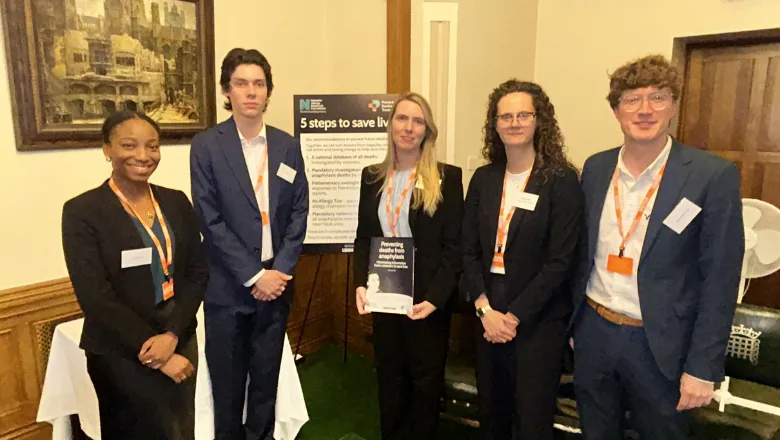Failings in the UK coronial system are putting the lives of people with food allergies at risk according to a new report authored by King's and funded by the Natasha Allergy Research Foundation.

Parents and family members from across the country, whose loved ones have died from a food allergy, attended an event alongside Dr Georgia Richards, author of the report, in the House of Commons yesterday.
Coroners serve a vital role in society by providing independent, transparent investigations into sudden, unexplained, or unnatural deaths, so that lessons can be learned to prevent future deaths.
Yet the new report reveals that while food allergy deaths by their very nature are sudden and unexpected, not all result in an investigation.
No statistics are collected to determine how many deaths are investigated by coroners that involve the most severe allergic reaction, anaphylaxis, and on average only two Prevention of Future Deaths (PFD) reports a year involve anaphylaxis - these are issued by coroners if they believe action should be taken to prevent future deaths.
Even when PFDs are issued, 40 per cent of organisations fail to respond within the statutory 56 days and 52 per cent fail to take any action, according to the report which analysed all PFD reports involving anaphylaxis between July 2013 and August 2025.
The report makes 5 key recommendations for changes to the inquest system in order to save lives. They are:
- Mandatory investigation of all anaphylaxis deaths by a coroner, with improved guidance for investigating these deaths
- A new statutory national database of all deaths investigated by coroners in England and Wales
- Parliamentary oversight for responses to Prevention of Future Death reports to ensure transparency and accountability.
- Mandatory national reporting of all anaphylactic events, including near-fatal reactions.
- The appointment of an Allergy Tsar.
Author Dr Georgia Richards, an epidemiologist at the Faculty of Life Sciences & Medicine and founder of the Preventable Deaths Tracker, a national vigilance platform that harnesses information from coroners to learn lessons following inquests, said the findings are 'the tip of the iceberg'.
Anaphylaxis is the worst illustration we have seen to date, where coroners are not only raising the same concerns in PFDs time and time again, but are repeatedly referring to other PFDs written by their colleagues, still - nothing is being done.
Author Dr Georgia Richards
She added: "Harnessing information from coroners could save lives from anaphylaxis. Urgent action is needed to prevent future deaths, including the appointment of a national allergy lead - an Allergy Tsar - to drive through change."
Nadim and Tanya Ednan-Laperouse OBEs founded The Natasha Allergy Research Foundation after their daughter Natasha died aged 15 from anaphylaxis after eating a baguette which failed to list sesame as an ingredient.
They said: "Natasha's death in 2016 from anaphylaxis was entirely preventable. It should never have happened. To lose a child to anaphylaxis is devastating. To fail to learn from the mistakes made, to help keep others safe and prevent future deaths, is unthinkable. We hope this study will help to shine a light on the need for action so that no more parents have to go through the terrible loss that we will always endure."
Families joining Nadim and Tanya at the event included Abimbola Duyile, whose 13-year-old daughter Hannah Jacobs died from anaphylaxis to milk in a Costa drink in 2023, Emma Turay, whose daughter Shanté Turay-Thomas died aged 18 from anaphylaxis to hazelnuts and Kerrie and Craig Stokes, whose daughter Hollie-Mai died aged 17 from anaphylaxis to walnuts.
The report called 'Preventing Deaths from Anaphylaxis: harnessing information from coroners to save lives' analysed the 6,000 PFD reports issued since they were formally introduced as part of the coronial system 12 years ago in an attempt to drive change and improve public safety.






